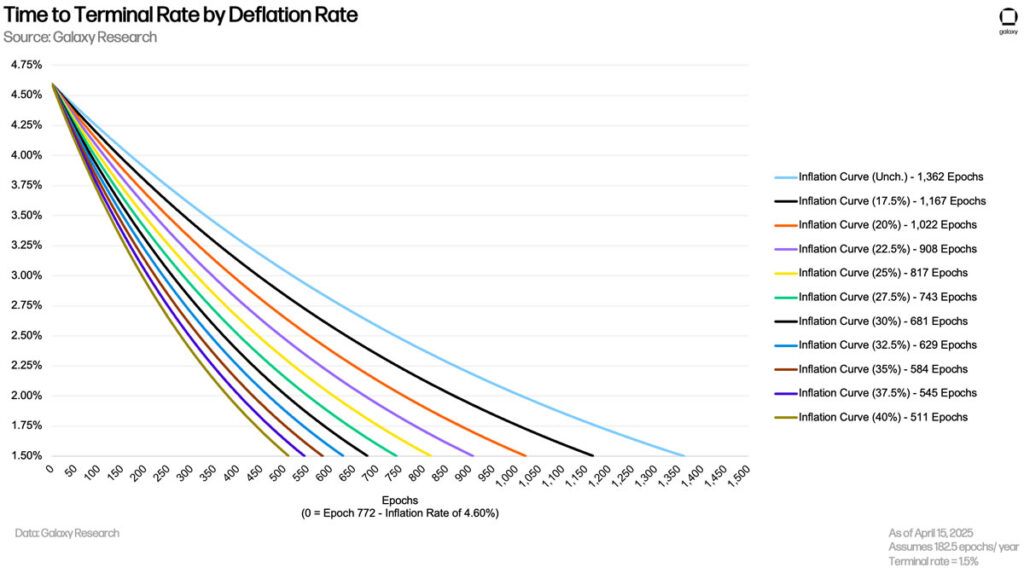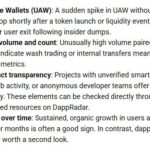In a pivotal move for the Solana blockchain, Galaxy Research has unveiled a new proposal aimed at reshaping how inflation rates for its native token, SOL, are determined. This proposal, dubbed the “Multiple Election Stake-Weight Aggregation” (MESA), comes on the heels of a previous voting attempt that failed to achieve a consensus on SOL’s inflationary trajectory. Recognizing the limitations of traditional voting methods, Galaxy’s MESA initiative seeks to introduce a more nuanced approach to inflation adjustments, suggesting a system where validators can express their preferences across a spectrum rather than simply choosing “yes” or “no.”
“Instead of cycling through inflation reduction proposals until one passes, what if validators could allocate their votes to one or many changes…?”
Galaxy Research’s proposal is a response to community feedback from an earlier proposal (SIMD-228), which highlighted a general agreement on the need to reduce SOL inflation without settling on specific numeric targets. The new voting system maintains a fixed terminal inflation rate of 1.5% and allows for multiple voting options on deflation rate proposals, ultimately calculating an average based on validator inputs. For example, if different percentages of validators support varying deflation rates, the outcome would be determined by taking a weighted average of those votes.
Currently, Solana’s inflation rate is set at 4.6%, and as part of its journey towards achieving a long-term goal, the proposal strives to streamline the decision-making process while enhancing predictability in inflation rates. With 64.7% of the total SOL supply currently staked, the stakes are high for both validators and the broader Solana community as they navigate the complexities of inflation management.
“Galaxy Research seeks to suggest a genuinely alternative process to achieving what we believe is the community’s broad goal…,”
This innovative approach could potentially lay the groundwork for a more flexible and market-responsive inflation mechanism, marking a significant step toward addressing the concerns surrounding inflationary practices in cryptocurrency ecosystems. As Solana evolves, the introduction of MESA represents a thoughtful consideration of community needs and governance dynamics within the blockchain landscape.
Proposed Changes to Solana’s Voting System for Inflation Adjustment
The recent proposal by Galaxy Research to adjust Solana’s inflation voting system aims to create a more effective and representative mechanism for determining the inflation rate of the SOL token. Here are the key points regarding this proposal:
- Introduction of MESA:
- The proposal, titled “Multiple Election Stake-Weight Aggregation” (MESA), aims to provide a market-based approach to setting SOL inflation rates.
- It seeks to solve the issues arising from the current binary voting system that has failed to reach consensus on inflation rates in the past.
- Voting Mechanism:
- Unlike the traditional yes/no voting, MESA allows validators to vote on multiple potential deflation rates.
- The outcome will be determined through a weighted average of the votes, promoting a more nuanced decision-making process.
- Maintaining Predictability:
- The fixed, terminal inflation rate is proposed to remain at 1.5%, providing predictability despite the flexibility in decision-making.
- This could help stabilize the market perception of SOL, as regular investors weigh potential outcomes.
- Community Engagement:
- The new system encourages more participation from validators by allowing them to express preferences across a range of options instead of a binary choice.
- This inclusivity may lead to greater satisfaction among community members as their diverse opinions can influence the outcome more effectively.
- Impact on the Market:
- A successful implementation could bolster trust in Solana’s governance and economic model, potentially attracting new investors.
- The dynamic nature of inflation adjustments may lead to more attractive staking options, encouraging users to participate in staking SOL.
“Galaxy Research seeks to suggest a genuinely alternative process to achieving what we believe is the community’s broad goal, and not necessarily proscribe any particular inflation rate outcome.”
Galaxy Research Proposes New Voting System for Solana’s Inflation Adjustment
The landscape of blockchain and cryptocurrency continues to evolve, and Galaxy Research’s latest proposition regarding Solana’s inflation model introduces a fascinating turn in governance mechanisms. Following the limitations of traditional binary voting seen in previous proposals, Galaxy has proposed a multifaceted approach known as Multiple Election Stake-Weight Aggregation (MESA). This innovative proposal comes on the heels of community consensus around the need for a lower inflation rate but highlights the challenges faced by existing voting methods.
Competitive Advantages: MESA’s primary advantage lies in its market-oriented method that permits validators to express preferences across a range of deflation rates rather than being limited to simplistic yes/no voting. By enabling an aggregated average based on stakeholder input, Galaxy’s proposal could lead to a more inclusive and representative outcome, ultimately fostering greater satisfaction within the community. This flexible structure potentially attracts validators who may have previously felt disenfranchised by binary options, enhancing engagement and driving more thoughtful decision-making. Moreover, maintaining a fixed terminal inflation rate at 1.5% provides a sense of stability amidst the variable dynamics of the crypto market.
Competitive Disadvantages: However, the introduction of MESA is not without its drawbacks. One potential pitfall is the complexity involved in understanding and participating in the voting process. Transitioning to a model where stakeholders must evaluate and rank multiple options could discourage participation among less experienced validators, ultimately placing decision-making in the hands of a more knowledgeable minority. Additionally, if robust educational resources are not provided, misunderstandings surrounding the new voting system may lead to conflict rather than consensus as varied expectations on outcomes emerge.
This proposed adjustment could offer benefits primarily to a broad base of Solana validators who previously felt limited by the binary choices of the past. A well-informed group of validators with an interest in participation could leverage MESA to voice nuanced preferences that reflect the community’s true sentiments. On the flip side, the complexity may create challenges for newer participants or those struggling to engage deeply with governance issues, potentially fostering division within the ecosystem.
As the crypto community watches how these developments unfold, the implications of such innovative governance proposals like MESA will resonate across similar projects. Competitors in the blockchain space seeking to refine their voter engagement strategies will undoubtedly take note—whether to emulate or to counter the new model introduced by Galaxy Research may ultimately shape the future landscape of decentralized governance models.

















